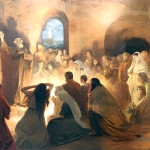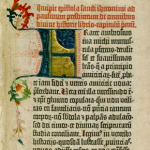A Sep-twofer
I’ve combined the Gospel passages for both the 22nd and the 29th into a single post; neither is especially long or complex, and they do form part of a single discussion on one coherent topic, manifest under multiple forms. The topic arises fairly naturally after the promulgation of the Petrine office (the Gospel from the 15th), and the forms it takes in the texts I’m analyzing here are along commonplace lines: now that the top spot in the messiah’s admin is spoken for, a. what’s the rest of the pecking order, and b. what do we do about people copying us? The common thread between these may not seem obvious at first glance, but it is familiar to readers of every period, language, and culture. Indeed, it is a drearily typical failing of religious persons and organizations—partly because it rarely allows its own right name to be spoken (and, for this among other reasons, has a specially easy time disgusing itself as an angel of light). That name is envy.
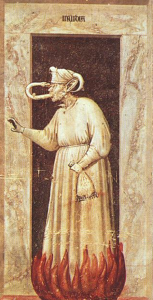
Invidia (“Envy”), an allegorical painting
by Giotto di Bondone, ca. 1306.
We’ll come back to this. Let’s first have a look at the text.
Mark 9.30-37; 9.38-43, 44, 45, 46, 47-48, 49-50, RSV-CE
They went on from there and passed through Galilee. And he would not have any one know it; for he was teaching his disciples, saying to them, “The Son of man will be delivered into the hands of men, and they will kill him; and when he is killed, after three days he will rise.” But they did not understand the saying, and they were afraid to ask him.
And they came to Capernaum; and when he was in the house he asked them, “What were you discussing on the way?” But they were silent; for on the way they had discussed with one another who was the greatest. And he sat down and called the twelve; and he said to them, “If any one would be first, he must be last of all and servant of all.”a And he took a child, and put him in the midst of them; and taking him in his arms, he said to them, “Whoever receives one such child in my name receives me; and whoever receives me, receives not me but him who sent me.”
† † †
John said to him, “Teacher, we saw a man casting out demons in your name, and we forbade him, because he was not following us.” But Jesus said, “Do not forbid him; for no one who does a mighty work in my name will be able soon afterb to speak evil of me. For he that is not against us is for us. For truly, I say to you, whoever gives you a cup of water to drink because you bear the name of Christ,c will by no means lose his reward.
“Whoever causes onee of these little ones who believe in me to sin,d it would be better for him if a great millstonef were hung round his neck and he were thrown into the sea. And if your hand causes you to sin, cut it off; it is better for you to enter life maimed than with two hands to go to hell,g to the unquenchable fire[, where their worm does not die, and the fire is not quenched].h And if your foot causes you to sin, cut it off; it is better for you to enter life lame than with two feet to be thrown into hell[, where their worm does not die, and the fire is not quenched].h And if your eye causes you to sin, pluck it out; it is better for you to enter the kingdom of God with one eye than with two eyes to be thrown into hell, where their worm does not die, and the fire is not quenched. For every one will be salted with fire. Salt is good; but if the salt has lost its saltness, how will you season it? Have salt in yourselves, and be at peace with one another.”

Salt deposits on the Jordanian shore of the
Dead Sea. Photo by Bernard Gagnon, used
under a CC BY-SA 3.0 license (source).
Mark 9.30-37; 9.38-43, 44, 45, 46, 47-48, 49-50, my translation
And they left there and passed through the Galilee, but he did not want anyone to know; he taught his students and told them that “The Son of Man is to be handed over into the hands of men, and they will kill him, and three days after he has been killed, he will rise again.” But they did not understand this message, and were afraid to ask him about it.
And he came to K’far-Nachum. And once they were in the household, he asked them: “What were you discussing on the road?” But they were silent, for they had been arguing with each other on the road who was the greatest. Having sat down, he called the Twelve and told them, “If anyone wants to be first, let him be last of all and servant of all.”a And taking a little child, he stood it in the midst of them, and scooping it up in his arms, he said to them, “Whoever will receive one of these little children for the sake of my name, he receives me; and whoever receives me, receives not me but him who sent me.”
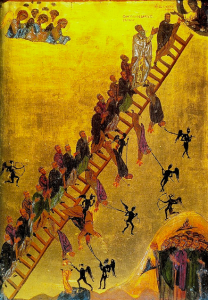
John told him: “Teacher, we saw someone casting out demons in your name, and we forbade him to, because he does not follow with us.” Jesus said, “Do not forbid him, for there is no one who will work power in my name who is also easily ableb to speak ill of me; for whoever is not against us, he is with us. For whoever offers you a little cup of water in my name, because you are of the Anointedc—amen, I tell you that he will not lose his reward.
“As for the person who trips upd onee of these little ones that believe in me, it would be better for him if a mule-drawn millstonef were placed around his neck and he were cast into the sea. So if your hand trips you up, cut it off: it is better for you to come deformed into life than to go out, having two hands, into Gehinnom.g, h Or if your eye trips you up, cast it out it is better for you to come one-eyed into the kingdom of God than to be thrown, having two eyes, into Gehinnom, where their worms do not end and the fire is not quenched. For everything will be salted with fire. Salt is good; yet if salt becomes un-salty, what will you season it with? Have salt in yourselves, and make peace with each other.”
Textual Notes
a. servant of all: As far as I know, it’s only incidentally interesting that the Greek word used here* for “servant” is διάκονος [diakonos], the source of the word “deacon” in English. More pertinent to the meaning of this passage is that one of the Latin epithets of the popes is servus servorum Dei, or “servant of the servants of God.”

This illustration (by Lucas Caspar Businger,
drawn ca. 1881) is excellently executed, but
what draws my attention here is the claim it’s
“depicting papal infallibility.” What? How?
b. who … will be able soon after/who is also easily able: The key word in this case is ταχὺ [tachü], an adjective meaning “swift, fast, quick” (as in the medical term tachycardia, or elevated heart rate). This can certainly bear the meaning offered by the RSV; mine is a slightly looser interpretation.
I find this passage striking, because we know from the later history of the primitive Church that ensuring legitimacy of authority by certifying who did and didn’t “follow with” the Apostles was going to be a concern of some moment (as in the episode of the sons of Sceva). Even so, Jesus plainly does not want the Apostles primed to be jealous of their dignity.
c. because you bear the name of Christ/in my name, because you are of the Anointed: The reason for the slighlty awkward syntax here is that the Greek is a little vague. “Because you bear the name of Christ” is a defensible translation, but to my mind, it overdetermines the meaning of the text. All it really says is “because you are of the Anointed,” which could mean a few distinct things. The “of” construction frequently represents the genitive case in Greek and Latin, because the English preposition “of” does a really good job covering the same range of grammatical functions. More often than anything else, some kind of possession or ownership is meant; the origin or creator of something can also be conveyed this way, as can what a thing or group is made “of,” and so on. (The genitive case has a wider range of meanings in Greek than in Latin, because Latin retained a couple more specialized cases that had fallen out of use in Greek.)
d. causes … to sin/trips up: The RSV here follows an ancient interpretive tradition by rendering the verb σκανδαλίζω [skandalizō] as “cause to sin”; however, it is an interpretive trandition, and one that goes slightly beyond the meaning of the term itself. A σκάνδαλον [skandalon] was, in its remote origins, a “jumper”: i.e., a thing that needs to be jumped over (like a hurdle, or the snare of a trap). In Christian discourse (and possibly in Greek-speaking Jewish discourse before it), this came to refer to temptations—sometimes in the restricted sense used by St. James (“God cannot be tempted with evil, neither tempteth he any man: but every man is tempted, when he is drawn away of his own lust, and enticed”), and sometimes in the broader sense present in the Book of Hebrews (“in that he himself hath suffered being tempted, he is able to succor them that are tempted”).
This term obviously relates to what is called the sin of scandal in Catholic moral theology. (A brief introduction to the topic can be found in the Catechism of the Catholic Church §§2284-2287.) For those unfamiliar, to give scandal is essentially to set a bad example—not merely in the sense of not being perfect or exemplary, but in the sense of giving others fresh ideas to do what is wrong, or fresh reasons to dispute, reject, or ignore the truth. For instance, if we let loose with a rude word during a specially exasperating task, and a very young relative overhears us and thinks that is a word they can simply say at any time, then we have—intentionally or not—given them scandal, as an older relative whom a child very naturally assumes can be relied upon for how they ought to behave.
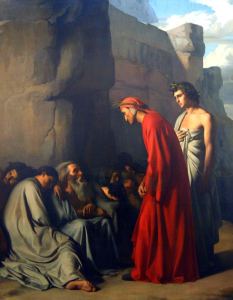
Le Dante, conduit par Virgile, offre des
consolations aux âmes des Envieux, a
scene from the Purgatorio by Hippolyte
Flandrin, 19th c.
Scandal is a somewhat tricky topic in moral theology, both because the person giving scandal may not intend or be aware of their action, and because the scandalous act need not even be wrong. The lengthy discussions in Acts, I Corinthians, and Romans about when and why eating meat sacrificed to idols was or was not alright turn on precisely this point: the objective act had been adjudged innocent by the Church in council, but it did not follow that every individual Christian could do so without entering mental territory that, for them, was vulnerable to wavering and temptations. The “strong” Christians, then, had a duty in charity to be tender with the tender consciences of their “weak” brethren; the liberty of the strong was curtailed. However, equally, the matter of principle had been decided in favor of the strong; the weak were not to strut about making up new rules that they were the best at keeping (which tends to be a favorite hobby of the weak), or to pretend that the strong were merely callous because they found themselves easily swayed.
The relationship between envy and scandal may not be entirely obvious at first either. The key to both is that they revolve around comparing ourselves with others.
e. one: It’s rather striking that the Greek here does not use a word like τίς [tis] “someone, anyone,” or a form of the definite article; it uses ἕνα [hena], the numeral one. In other words, Christ is conveying in exceedingly exact language what the worth of literally every individual is to him and to his Father.
f. great millstone/mule-drawn millstone: What the text actually called for is a μύλος ὀνικὸς [mülos onikos], or a “donkey-type millstone” (the newest of the ultra-rare Pokémon). Millstones in general aren’t very familiar to most of us today: they were used to grind wheat or barley kernels into flour. Some were small enough to be used by hand, like a mortar and pestle. Others required mutiple people, or even—a draught animal.
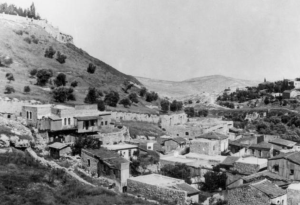
The Valley of Hinnom, photographed in 1948
by Aviva Rabinovich.
g. hell/Gehinnom: The Greek here is Γέεννα [Ge’enna], representing a Hebrew-Aramaic גֵיהִינֹּם [Gêhînnom]. This was a valley or gorge to the southern edge of Jerusalem, which reputedly was used as a garbage dump at this time. In the time of the divided monarchy, particularly under King Manasseh (who reigned in the first half of the seventh century BC, immediately after the Kingdom of Israel was destroyed), it is thought to have been the site of a תֹּפֶת [tofeth], a shrine dedicated to the purpose of sacrificing infants to Molech.
h. [vv. 44, 46]: Here, we at last have not only a simple textual note, but a simple and very good reason that the reading skips two verses it might easily have included! Verse 48 does say “where their worm does not die, etc.,” and in some manuscripts of Mark, this is the third in a series of repetitions on Jesus’ part, the two repetitions being verses 44 and 46 in the standard versification of the Bible.** However, the earliest and the best manuscripts of Mark lack verses 44 and 46. Scholars think that what happened here is most likely that a copyist (for any one of several reasons) looked at the wrong line of the text while creating his copy of Mark, and thus replicated the line in extra places in the text; then, subsequent copies made from that copy faithfully reproduced the mistake.
Another possibility—just in a general sense; I don’t know of evidence that would suggest this specifically is the cause of this—would be that, if this text were put to special use in some local church’s rites (e.g. in a litany or a catechism), that ritual usage might have involved the repetition of the phrase “where their worm does not die, etc.” A scribe from that community might then, without even necessarily realizing it, have inserted the ritual form he was familiar with instead of the strictly textual form.
*The alternative term to use here, which does occur quite frequently in the New Testament, would be δούλος [doulos], “slave.”
**For this system of chapters and verses (or, if you’re in a mood to sound snotty, of capitulation and versification), we may thank Stephen, Cardinal Langton, sometime the forty-fourth Archbishop of Canterbury in succession from St. Austin.


